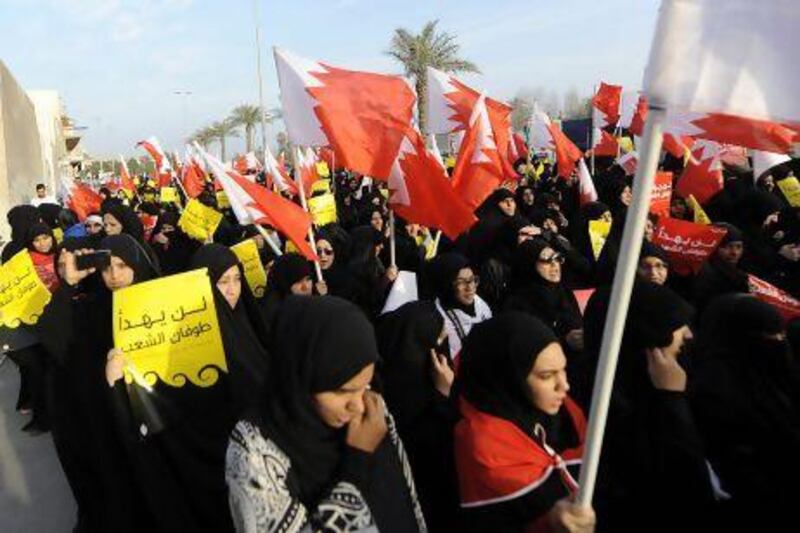SAKHAIR, BAHRAIN // On the eve of the second anniversary of the uprising in Bahrain, 27 delegates from across the political spectrum left the capital and took a road leading to a pristine resort in the desert.
The atmosphere for talks between the opposition, government and pro-government representatives could hardly be more different from the memories of February 14, 2011.
That day, tens of thousands of Bahrainis took to the streets in Arab Spring-inspired gatherings at Manama's central Pearl Roundabout.
This week political groups have been coming to this desert resort for dialogue, the first such attempt since talks broke down in the summer of 2011.
The closed-door sessions started on Sunday and will convene twice a week until consensus is reached to end the impasse between the government and those opposed to it.
But the stakes are high, the parameters of the talks are unclear, and big questions remain about the ability for the forum to bring about a solution that meets demands for political change.
"What if the dialogue fails? The outcome would be disaster, not just for the opposition but for the government and everyone," said Abduljalil Khalil Ebrahim, former head of opposition society Al Wefaq's parliamentary bloc. "If we lose hope this time, people will feel like they have to fight. This is the danger if the dialogue fails."
The return to the negotiating table began with Bahrain's King Hamad bin Isa Al Khalifa, who on January 22 invited political societies to seek consensus in talks led by the justice minister.
In the subsequent weeks, the nature and direction of those talks have become more apparent.
A coalition of opposition parties holds eight seats in the negotiations; an alliance of pro-government groups holds another eight. The delegates are not fixed, and the largest Shiite opposition bloc plans to change its representation depending on the issues being discussed, inserting their internal experts as needed.
Eight legislators are also around the table, as well as three government ministers. Two independent moderators lead the discussions, and everything will be decided by consensus, rather than voting. For now, parties are focused on how the dialogue will function. The coalition of opposition groups has proposed four principles, including the participation of the royal family, a clear timetable for talks, and a public referendum to ratify results. Mr Ebrahim said pro-government groups had shown tentative agreement on all points but the referendum.
After the methods of discussion are fixed, talks will move to the agenda, where there is some consensus too, said Ahmed Alsaati, an MP and delegate at the dialogue.
"We found that 70 per cent of both [political alliances'] agendas are the same," he said. Both pro- and opposition groups seek reforms such as better anti-corruption rules, a restructuring of electoral districts which are now unevenly drawn, a review of naturalisation policies for citizenship, and economic welfare improvements, he said.
Sticking points involve discussions over elected government, a key demand of the opposition and one that so far pro-government groups have resisted.
"We are not mature enough," said Mr Alsaati of the proposal. "We don't have strong parties with experience leading."
Despite the disagreement, however, all sides seem haunted by the realisation that these talks are crucial.
Groups have vowed to work through differences in and out of the official sessions, held twice a week for two hours.
"Seriousness was in the air," said Isa Abdulrahman, spokesman for the National Dialogue, speaking about the first meeting on Sunday.
Part of the urgency stems from the very real economic strains that unrest has caused. Office gossip often begins and ends with discussions of where roads are blocked by burning tires and how much time it added to a commute. Few businesses have left Bahrain, but few are coming to set up shop.
Large-scale protests continue weekly, with smaller evening demonstrations in shia villages several nights in between.
Among opposition groups, there is also urgency from the street, where opinions among the opposition range from scepticism to hostility.
"We don't want dialogue, we are saying they should release all the political prisoners first," said Naima Mohammed, a mother who attended a protest of hundreds in the village of Sanabis on Tuesday. Carrying signs reading "We will not be stopped," many demonstrators said they were filled with mistrust of the ability of the government to deliver reform after the talks.
"The offer [for dialogue] in hand, we don't know yet if it is a real offer," said Jasim Hussein, an economist and former Al Wefaq MP. "But we are trying to make it a real opportunity."
edickinson@thenational.ae
twitter: For breaking news from the Gulf, the Middle East and around the globe follow The National World. Follow us





